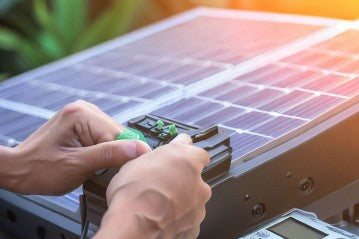
Solar energy is becoming an increasingly popular source of renewable energy for homes and businesses alike. The use of solar panels to generate electricity is a great way to reduce reliance on fossil fuels and decrease carbon emissions. However, one of the challenges with solar energy is managing the flow of electricity from the panels to the battery. This is where a solar charge controller comes in – it regulates the voltage and current coming from the solar panels to ensure that the battery is charged safely and efficiently. But, can a solar charge controller work without a battery? In this article, we will explore the answer to this question and what you need to consider before making a decision.
How a Solar Charge Controller Works?
Before we dive into whether a solar charge controller can work without a battery, let's first understand how it works. A solar charge controller is an essential component in a solar power system. It regulates the voltage and current coming from the solar panels to ensure that the battery is charged efficiently and safely. The solar charge controller acts as a traffic cop, directing the flow of electricity from the panels to the battery.
There are two main types of solar charge controllers: PWM (Pulse Width Modulation) and MPPT (Maximum Power Point Tracking). PWM charge controllers are the more basic type and are suitable for smaller systems. MPPT charge controllers, on the other hand, are more advanced and can handle higher voltage systems. They are more efficient and can extract more power from the solar panels.
The process of how a solar charge controller regulates the flow of electricity from a solar panel to a battery is relatively straightforward. The controller monitors the voltage and current of the battery and adjusts the incoming voltage and current from the solar panel to ensure that the battery is charged safely and efficiently. When the battery is fully charged, the controller will stop or reduce the flow of electricity to prevent overcharging.
Can a Solar Charge Controller Work Without a Battery?
Now, let's address the question at hand – can a solar charge controller work without a battery? The answer is yes, it is possible to use a solar charge controller without a battery. However, there are some important factors to consider before deciding to go down this route.
One of the main reasons why someone might consider using a solar charge controller without a battery is to power DC (direct current) loads directly from the solar panels. This setup is known as a "direct-coupled" solar power system. In this configuration, the solar panels power the DC loads directly, without the need for a battery to store excess energy. However, this type of system is only suitable for certain types of loads, such as water pumps, fans, and lighting. It is not suitable for appliances that require AC (alternating current) power, such as refrigerators, washing machines, and air conditioners.
Another reason why someone might consider using a solar charge controller without a battery is to save money on the cost of batteries. Batteries can be an expensive component of a solar power system, and they have a limited lifespan. By eliminating the need for batteries, you can reduce the overall cost of the system and simplify the installation process.
However, there are some potential drawbacks to using a solar charge controller without a battery:
1. For one, you will not have any backup power in case of a power outage or if the solar panels are not generating enough power.
2. Additionally, you will not be able to store excess energy generated by the solar panels for use later. This means that you will only be able to use power generated by the solar panels during daylight hours.
3. Another potential issue with using a solar charge controller without a battery is that the voltage and current from the solar panels can fluctuate. This can cause damage to sensitive electronic devices, such as computers and televisions. To prevent this, you will need to use voltage regulators and surge protectors in your system.
In summary, while it is possible to use a solar charge controller without a battery, it is important to consider the specific needs of your system and the potential drawbacks before making a decision. If you are only powering DC loads and do not need backup power, a direct-coupled solar power system may be a viable option for you. However, if you require AC power or want to store excess energy for later use, a battery-based system is the better choice.
Conclusion
A solar charge controller is a critical component of any solar power system. It regulates the flow of electricity from the solar panels to the battery, ensuring that it is charged safely and efficiently. While it is possible to use a solar charge controller without a battery, there are some important factors to consider before deciding to do so. By understanding the specific needs of your system and the potential drawbacks, you can make an informed decision about whether a battery-based or direct-coupled solar power system is the right choice for you.

0 Kommentare